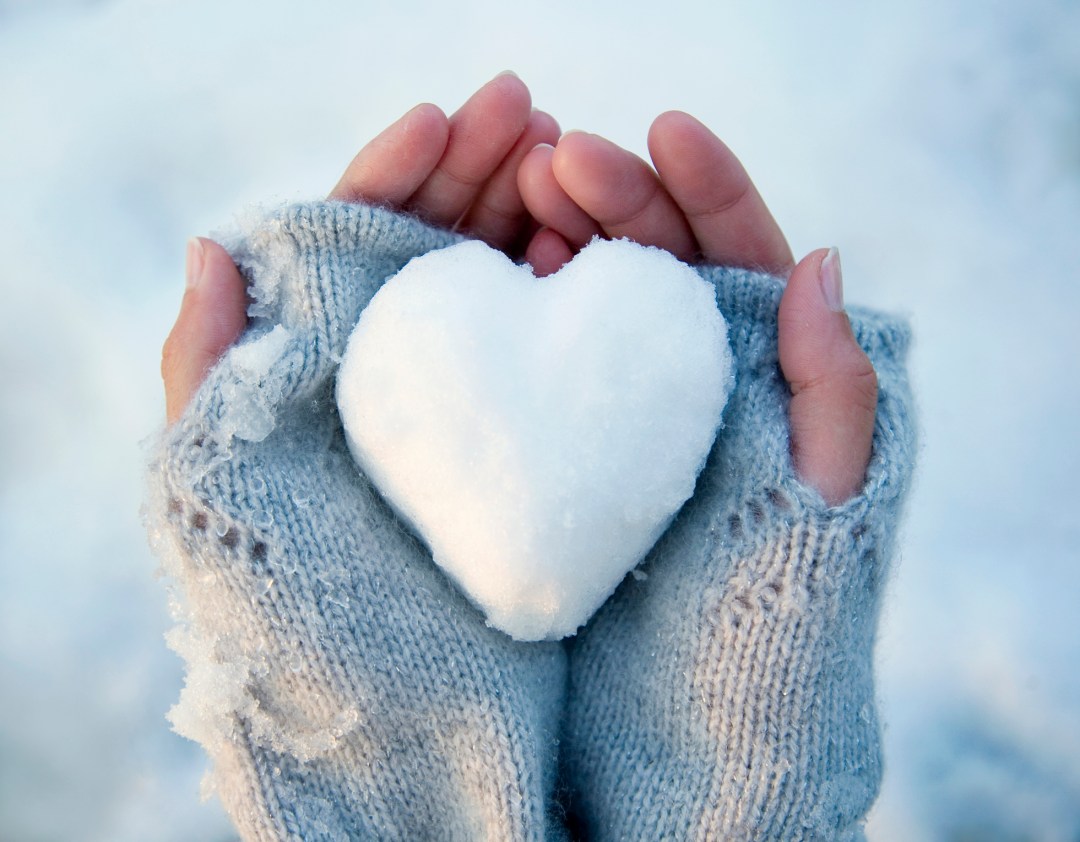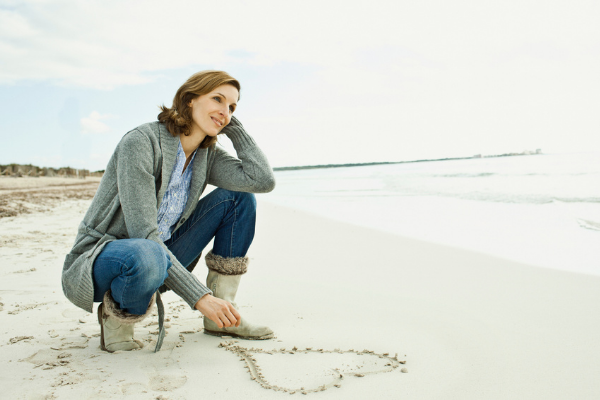How to nurture lasting love: Dossier special
It’s been written about for centuries, but the secret to finding love, and keeping it, is as much of a mystery as ever. Heidi Scrimgeour learns how to cultivate a happy and enduring relationship

I’m a big fan of a Rumi quotation and one of my favourites is: ‘Close your eyes, Fall in love, Stay there.’ If only the 13th-century poet had thought to include a footnote on just how to do that. The older I get, the more convinced I am that the trickiest thing about love isn’t finding it, but keeping it. Falling in love is easy. Staying in love? Not so much. And I say that as someone who’s been married to a lovely man for 23 mostly wonderful years.
The very things that make us fall in love with someone are often the things that change about them as the years pass. When I met my husband, aged 19, his outlook on life and sense of spontaneity were two of the most exhilarating things about him. But, at 46, and with three children between us, we have little opportunity for spontaneity. And his world view has changed dramatically.
We’re lucky: we’ve discovered new reasons to love each other and fresh things to find attractive. But the things that first drew us to each other have shifted over time. Some days our differences dominate, creating distance. Other days, all I notice is how much he still makes me laugh. He brings me a cup of coffee in bed every morning. He remakes the bed without being asked, when I wash the bedding and leave it languishing in the tumble dryer. These aren’t things that I imagined caring about when we said ‘I do’. But those thoughtful, loving gestures help keep me head over heels – even when life’s challenges make that incredibly hard.
‘I think the idea of falling in love is an illusion, and it often renders people powerless,’ says the relationship and divorce coach Maxine Clancy. ‘If you fall in love, then you can fall out of it just as quickly. Whereas I believe love is a choice. And it’s something you have to keep choosing over and over again.’
I first heard someone describe love as a choice when I was still in the first flush of falling for my husband. I thought it sounded depressing and unromantic. Why would you ever have to choose to love ‘the one’? Of course, I smile at my own naivety now. Choosing to love someone isn’t a chore to be endured. It doesn’t mean the spark has gone and you’re merely finding things to tolerate about each other. Choosing someone – on bad days, when they hurt you, and even when it feels like a sacrifice – is a richer, deeper love than the effortless kind that comes so easily in the beginning. And to be continually chosen by someone – even when you’re not entirely deserving of it – is truly a gift.
 ‘When we first meet someone, we project our ideals on to them rather than seeing them for who they are,’ says Clancy. ‘Then, we move from romanticised projection to unconditional love.’ But it’s difficult to love someone unconditionally if we’re holding on to limiting beliefs about ourselves – because we also project those on to our partner. Working on ourselves is, therefore, the first step towards cultivating a lasting relationship.
‘When we first meet someone, we project our ideals on to them rather than seeing them for who they are,’ says Clancy. ‘Then, we move from romanticised projection to unconditional love.’ But it’s difficult to love someone unconditionally if we’re holding on to limiting beliefs about ourselves – because we also project those on to our partner. Working on ourselves is, therefore, the first step towards cultivating a lasting relationship.
‘Unconditional self-love is the fertile ground upon which deep love for another can develop,’ adds Clancy. ‘That requires us to look within and take ownership – with compassionate kindness – of how we show up in our relationships.’
Perhaps even Rumi didn’t know the secret to staying in love. But the fact that he urges us to even try convinces me that it’s a goal worth pursuing. Which brings me to another of my favourite quotations, this time by an unknown author: ‘Being someone’s first love may be great, but to be their last is priceless.’
Believing in love
Maxine Clancy shares her advice for lasting love.
Experiencing love that lasts always begins with you – not finding the perfect partner. The most fundamental human needs are to be seen, heard, loved and to feel safe. Our beliefs about love and relationships are formulated throughout our childhoods. We absorb the message that love is outside of ourselves, and we have to be a certain way in order to be worthy of it.
Within our being, there is the ego, the inner child, the authentic adult and the higher self. We seek to find wholeness throughout our adult lives because the ego makes us believe that we are separate. This is where relationship problems and challenges arise.
All relationships will eventually bring up our inner childhood wounds. When the ego is in control, it operates from the need to feel safe and secure, and uses coping strategies learned in childhood to be acceptable to others and get love in return. People pleasing, perfectionism, controlling, avoiding conflict and feelings of not being enough surface in our relationships for a purpose: so that we can heal our childhood wounds.
Maybe you had a parent who was emotionally unavailable, highly critical or unable to regulate their own emotions. Your relationship is an opportunity to heal this part of you, to learn to attend to yourself and your needs, and work through your fears of rejection.
This psychological work always starts with you, although we live in a culture that tends to blame external factors, be it partners, work or lack of money. I believe that’s because many of us operate from our inner child, so we’re disconnected from our sense of power and authority.
Thinking to shift the power from your ego or inner child back to your empowered adult self:
 If you have yet to find love that lasts, it can feel like an enigma, a myth made up by those who have had better luck than you. But if you’re longing for lasting love – be that a completely new relationship or a happier chapter for the one you’re in – there are steps you can take to attract it.
If you have yet to find love that lasts, it can feel like an enigma, a myth made up by those who have had better luck than you. But if you’re longing for lasting love – be that a completely new relationship or a happier chapter for the one you’re in – there are steps you can take to attract it.
Falling for the idea that finding love is a task to be tackled – like filing your tax return – can mean we end up repelling what we seek. This, in part, explains why people often meet ‘the one’ when they’ve given up on love or declared themselves out of the dating pool.
‘People in jobs they enjoy often get other job offers, and someone who already has a partner often attracts other potential partners,’ says the sex and relationship therapist Cate Mackenzie. That, she believes, is all about the energy we give out. ‘When you’re relaxed and happy, you’re more likely to be fun and engaging to be with, sending signals for others to connect with you. Whereas when you emit a sense of urgency about finding love, that anxiety can be off-putting to other people and might even chase them away.’
Taking steps to ready yourself for a new or deeper relationship can help you welcome those connections when they come your way. ‘If you’re looking for love, it’s important to be ready and open to receive it,’ says Mackenzie. ‘That someone special could turn up at any point and, if you’re not prepared, you may not be ready to swap numbers, let alone welcome them into your life.
‘Most people live with internalised false beliefs about love, and their lovability or worthiness to be loved. You may think “I’m not enough”, “no one will love me” or “I need to be perfect to be loved”. It’s unconscious, so we often end up attracting people who treat us in ways that mirror those beliefs,’ Mackenzie explains. The antidote is to recognise that we are the source of our own experience.
How? Start by looking at all the areas of your life where you are not demonstrating love, Mackenzie suggests. ‘How do you talk to yourself? How do you talk about your body? Do you spend time doing things you enjoy? Are you cultivating your hobbies, talents or passions? Are you creatively expressing yourself? Listen to your inner voice and demonstrate your worthiness to be loved.’
Receiving love
We tend to talk about love as something that can be pursued, but Katie Phillips, a women’s empowerment master coach who helps midlife single women prepare to meet their soulmate, says it’s less about finding love and more about receiving it – whether you are looking for love, or have been with the same person for decades and want to keep the flame alive.
‘I believe one of the biggest blocks to love is the idea that it is something you have to figure out and make happen,’ says Phillips. ‘But you have enough on your plate, and the idea of figuring out dating or how to meet someone can exhaust you before you even begin. Women don’t need another thing to do, and when you are giving out that energy, you may actually repel what you so desire – to love and be loved.’
Phillips believes our relationships hold a mirror up to us, highlighting where we have healing to do. ‘Humans are always evolving and growing, and our relationships show us how – if you desire a healthy, emotionally available, intimate relationship, you must be able to have that with yourself first,’ she says. ‘You must be OK with prioritising your relationship with yourself too. That means dropping the guilt around putting yourself first and valuing your time. When you have an empowered relationship with yourself, you become an energetic match for someone who has that with themselves.

If you are committed to being the best version of you then you will attract the same in your partner.’
Identifying your limiting beliefs is an important starting point. ‘We get what we think about – our thoughts are creating our lives, so start to notice what you believe you are worthy of,’ says Phillips. She recommends this exercise to rewire your mind and let go of beliefs that are harming you:
‘Affirmations help assert the beliefs you desire to adopt as your new normal, and start with present-tense words, such as I am, I have, I love, I enjoy, I create,’ explains Phillips. An affirmation should feel realistic to you and evoke positive, good feelings. ‘Display them around your house, set them as reminders on your phone, or record them as voice notes and listen to them while you’re getting ready for your day, driving to work or walking the dog,’ she adds.
Keeping love alive
Why do some people stay madly in love for ever, while other couples become irritated by every little thing the other one does before the honeymoon is even over? Do some people simply have better skills at keeping love alive, even against the odds?
Good news: you’re not at the mercy of love’s whimsical ways. You can actively cultivate lasting love, much like you nurture plants in a greenhouse rather than leaving them out in the frost and hoping for the best. Psychology shows that the way you think about your relationship directly impacts what you’re likely to experience within it. Your thoughts shape your feelings and your feelings influence your actions.
A thought consistently dwelled upon can become a belief, and beliefs impact our engagement with the world. If you believe that you’re bad at relationships or that partners will always tire of you, your brain will actively filter out interactions that contradict that belief.
If you start to believe that the spark has gone out of your relationship, you’re less likely to look for signs that it can be rekindled. And if you’re in a partnership but window shopping – even in your daydreams – your relationship will likely feel disappointing. Reframing the way you think about love puts you in the strongest position for experiencing it.
 ‘It may well be that some couples have such great chemistry and magnetism (or know themselves really well and can communicate brilliantly) that they have harmony for the rest of their days, but in my experience most couples have issues to work through,’ says the therapist Cate Mackenzie.
‘It may well be that some couples have such great chemistry and magnetism (or know themselves really well and can communicate brilliantly) that they have harmony for the rest of their days, but in my experience most couples have issues to work through,’ says the therapist Cate Mackenzie.
It can feel, in the midst of working through those issues, as if we’re pushing water up a hill. Perhaps we fell for the story that real love shouldn’t be this difficult. Or maybe we’re fooled by couples on social media whose curated highlights make being in love look easy. In fact, cultivating love will always require effort.
‘For many people, there may be an initial harmony as the sex hormones dopamine, serotonin and oxytocin, the hormones of falling in love, rush through their bodies and they feel as if they’ve met the perfect person,’ adds Mackenzie. ‘This head rush of Eros energy lasts between six months to two years, depending on the relationship.’
When that first flush of lust wanes, we can reach the conclusion that the spark has gone from our relationship. But actually, this can be the moment when love grows richer and deeper. Rather than defining it as the end of love, Mackenzie recommends reframing it as the beautiful gift of having a long-term partner. ‘You get a deep opportunity to grow and develop into a more authentic and well-rounded person as a result of being challenged and learning how to be in a relationship,’ she explains.
Instead of dwelling on your partner’s faults, shift the focus on to you. Invest in your friendships, make time for fun and consider counselling or therapy. ‘These things often mean you walk through the door a friendlier person, which can lift a relationship,’ says Mackenzie.
‘It can be tempting to conclude that all would be well if your partner changed,’ she adds, ‘but this moment in a relationship can be an amazing opportunity to heal the past, take responsibility for your own needs and wants, and take a journey into your own vulnerability and authenticity.’
‘Honouring each other’s dreams is vital’
Sarah Bramall from St Albans in Hertfordshire met her husband, Jon, on a dance floor in Leeds in 1999. They have three children aged 13, 11 and seven. ‘I had no idea that meeting would turn into love!’ says Sarah, 43. ‘We were university students and just two weeks earlier, Jon had signed up to join the army after his medical degree. It was a 10-year commitment that would mean him moving to Plymouth at the other end of the country. It didn’t seem a big deal, until three years later,’ she says.
‘I was working as an English teacher and it seemed as if our lives were taking us in different directions. I decided to leave my job and go with him, but at a job interview someone said to me: “You’re giving up your career for your boyfriend.”
‘The words struck a chord. I realised we could never be happy if I had to give up my dreams for his. After that, I took a job in Italy, but when I told Jon he went pale – he’d already bought an engagement ring!’ she laughs. ‘Despite the distance that would lie between us, I said yes. It was difficult, but we made it work, even when he was deployed to Iraq. We got married in May 2005, when he made a mad dash home for the ceremony,’ says Sarah.
‘But things got tougher when we started a family,’ she explains. ‘We were living on a military base and I tried to integrate my life with those of the other mothers and their children, but it wasn’t for me. I found that going back to work helped me stay sane, with a sense of my own identity.’
As a parent, Sarah’s support network became invaluable: ‘Having the solid backing of my old friends, along with regular visits from them and my mother, meant I didn’t feel so alone when Jon was away,’ she says.
‘We’ve had rough times but keeping our independence and learning to compromise means we are still here, 22 years and three children later.
‘Jon gave me unquestioning emotional and practical support when I changed careers to become a life coach five years ago, and knowing that he respected my need to do this meant everything to me.’
What is the secret to their lasting love, despite the challenges? ‘Shared values, friendship and a commitment to making our relationship work are key,’ Sarah says.
‘During the pandemic I’ve been holding the fort at home while Jon works as an ICU consultant. I remember him packing his bag to go to the hospital in the early weeks, saying: “I don’t know when I’ll be coming back.” It felt like it did when he went away to war,’ she remembers.
‘But we’ve gone through so much that I’m confident our relationship can overcome any obstacle. We just need to keep listening and working at it.’
Find out more about Sarah Bramall’s life coaching services at sarahbramall.com.
Photographs: Getty Images








